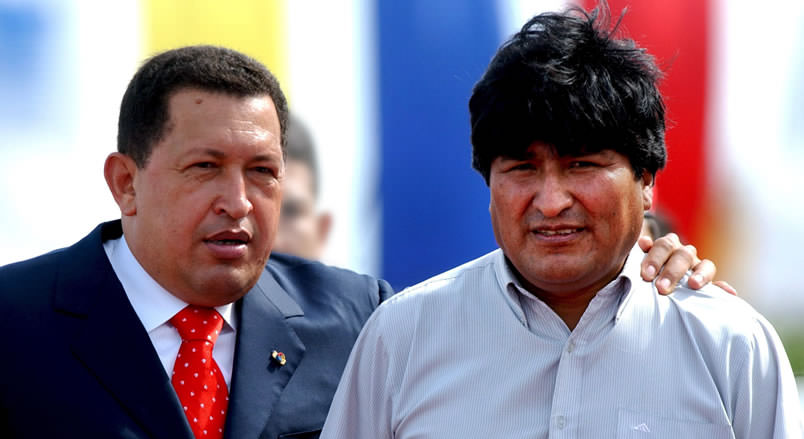 TD Original
TD Original
The Big Blowup Over Venezuela
Dec 14, 2005 Update: Hugo Chavez and the Latin American left picked up an important new ally when, a few weeks ago, peasant leader Evo Morales (shown at right here) was elected as president of Bolivia. What's all the fuss over Hugo Chavez? Marc Cooper examines the mercurial leader and his contentious relations with the Bush administration. 1 2 3 4Whither U.S. Policy?
That said, the current Bush policy of blind hostility and confrontation toward Chavez is not only hypocritical but also counterproductive--damaging to Washington, to Venezuela, and ultimately to the Venezuelan people. Wayne Smith, a former U.S diplomat in Cuba, and a relentless critic of Washington policy toward Latin America, sees a discouraging parallel with the absurd relationship that 10 American presidents have had with Fidel Castro. Any legitimate criticism of Castro was overshadowed by American bullying and threats. And that unremitting hostility only served to reinforce Castro's grip on power. "He plays David to our Goliath in a way that reverberates splendidly in Latin America,"' says Smith of Castro. "Now, Chavez is doing the same thing."
Worse, this sort of tunnel vision by Washington "blinds U.S. policymakers to the fact that Chavez's influence in Latin America is not all pernicious and, no matter how much it is hated, may be presenting solutions to Latin America's real problems in ways that Washington is not," as Washington Post columnist Marcela Sanchez put it.
The era of armed Latin American insurgencies has come to an end. And the discontented and the disenfranchised have been using the ballot box and not bazookas to demand social change. The United States should support those efforts rather than short-circuit them.
Whatever his manifold flaws--and without losing sight of some worrisome trends--Hugo Chavez is the duly elected president of Venezuela. While the power relationship between the two countries is wildly disparate, each side has the equal obligation of working with the other despite policy differences. Chavez has the perfect right to roundly criticize and, if he wishes, denounce U.S. policy and development strategy. But he does his people no favor by unduly exacerbating conflict with Washington. The U.S. government, meanwhile, also has the right to criticize Chavez for any violations of democratic rule of law. But those critiques lose all practical and moral value unless they are divorced from illegal and outrageous policies of regime change and covert destabilization and if they don't simultaneously match up with good-faith efforts of regional and hemispheric cooperation.
You need to be a supporter to comment.
There are currently no responses to this article.
Be the first to respond.